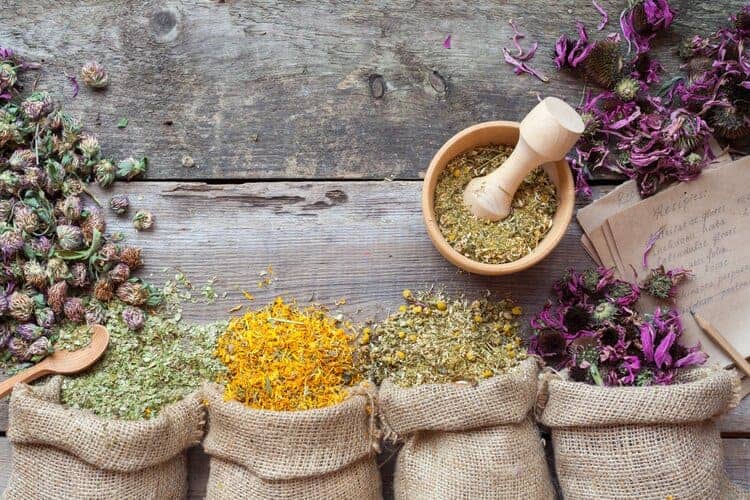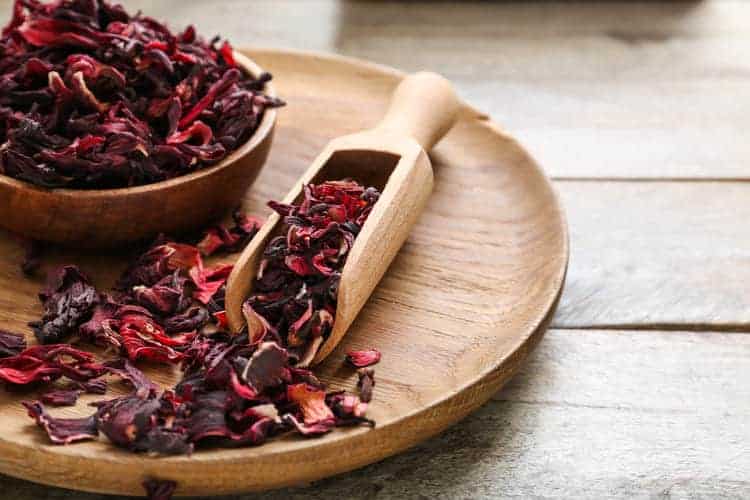
When your skin is crying out for an extra dose of pampering, an herbal facial steam can be a very luxurious treat. Not only does steaming help to improve circulation, but by adding herbs to the mix, your skin might enjoy some additional therapeutic benefits.
The potential benefits come from the volatile oils (aka essential oils) that are released when herbs are steeped in hot water.
Those volatile oils have a range of therapeutic properties and many of them can be:
- Anti-aging.
- Antibacterial.
- Anti-inflammatory.
- Astringent.
Since those volatile oils are carried in steam, some people believe that herbal face steams can be helpful for the skin.
However, it’s important to note that:
- Since these oils are volatile, they do evaporate quite easily.
- It’s not clear how much of these oils are actually carried into steam and onto the skin.
So, while steaming does release the essential oils that are in plants, steaming should not be seen as equivalent to topical application of essential oils.
Rather, the main benefits of herbal steaming lies in the fact that it increases blood flow to the face, promotes detoxification (via sweating) and softens the top layer of skin (which improves the penetration of products that you apply afterwards).
Now, that we’ve covered the basics of steaming, let’s have a look at some herbs that you can use.
12 HERBS FOR FACIAL STEAMING (AND THEIR BENEFITS)
1. Hibiscus

Main properties (source):
- Rich in antioxidants and alpha hydroxy acids.
- Contains mucilage, which is moisturizing to the skin.
- Regulates oiliness.
- Helpful for sensitive skin.
2. Basil
Key benefits (source):
- Anti-microbial and anti-inflammatory.
- Enhances skin moisture and soothes dry/rough skin.
3. Elderflower
Main properties (source):
- Anti-inflammatory.
- Rich in antioxidants.
- Promotes circulation.
- Mild astringent, which is helpful for tightening pores.
4. Chamomile
Core benefits:
- Rich in antioxidants.
- Soothes inflammation, as well as the side effects of free radical damage.
- Helpful for inflammatory skin conditions like eczema, rosacea and psoriasis.
5. Lavender
Some of its main benefits (source):
- Reduces swelling and redness caused by acne and other inflammatory skin conditions.
- Anti-microbial and inhibits p. Acnes, which is the bacterium that contributes to acne.
- Suitable for all skin types, but particularly helpful for dry, sensitive, inflamed and mature skin.
6. Calendula

General properties and benefits (source):
- Cools and moistens the skin.
- Beneficial for inflammatory skin conditions like acne, eczema and psoriasis.
- Classified by herbalists as a vulnerary i.e. speeds up wound healing.
- Antimicrobial and antifungal.
7. Comfrey
Main benefits and common uses (1, 2):
- Relieves pain and inflammation.
- Promotes skin renewal or cell turnover.
- Balances oily skin.
- Improves fine lines and wrinkles.
- Suitable for all skin types, but particularly soothing for dry, sensitive, inflamed and mature skin.
8. Peppermint
Main characteristics (source):
- Antiseptic, antibacterial and anti-inflammatory.
- Soothes acne-related redness as well as itching (from bug bites, for example).
- Great for all skin types, but particularly helpful for balancing oily and acne-prone skin.
9. Rose Petals & Buds
Main benefits (source):
- Helps the skin to retain moisture.
- Anti-inflammatory and anti-microbial.
- Suitable for all skin types, but particularly soothing for dry, sensitive, inflamed and mature skin.
10. Violet Leaf
General properties (source):
- Naturally cleansing.
- Natural source of salicylic acid.
- Contains mucilage which hydrates the skin.
- Considered beneficial for oily skin as well as sensitive skin.
11. Rosemary
Key benefits:
- Natural astringent.
- Anti-inflammatory and antimicrobial.
- Rich in antioxidants.
- Promotes circulation.
- Great for oily and acne prone skin
12. Turmeric
General benefits:
- Anti-inflammatory.
- Rich in antioxidants.
- Suitable for oily and acne prone skin.
HOW TO STEAM YOUR FACE NATURALLY WITH HERBS
1. Cleanse your skin to get rid of makeup, dirt and oil.
2. Place ½ cup of dried herb and 4 cups of hot water into a large, heat-proof bowl.
3. Sit down with your face about 8 – 12 inches away from the bowl.
4. Drape a large towel over your head and the bowl, so that it creates a tent around you. This will help to trap in the steam.
5. Close your eyes and enjoy the steam for up to 10 minutes.
6. Dry your face and then apply one of these soothing homemade face masks. Otherwise, use this guide on what to do after steaming to find the next best steps for your skin.
NOTE: Fresh herbs are best for steaming. But if you can’t find any, dried herbs are a good substitute.
DIY HERBAL FACE STEAM RECIPES
There’s no limit to the herbs that you can combine. It’s really just a matter of what you have on hand and which aromas you find pleasurable.
That said, here are some combinations to try:
- Rosemary, peppermint and lavender.
- Calendula, lavender and comfrey.
- Peppermint and rosemary.
- Rose buds and peppermint.
In addition, feel free to throw in a drop of your favorite essential oil into any of the above blend. This will kick up the aromatherapy effect! Here are some oils to choose from:
- Geranium.
- Rose.
- Rose geranium.
- Lavender.
- Rosemary.
- Tea tree.
- Peppermint.
- Clary sage.
- Lemon.
FAQs ABOUT STEAMING YOUR FACE WITH HERBS
Can you put herbs or tea in a facial steamer?
In general, it’s not advisable to add herbs or any liquids (besides water) into a store bought facial steamer. The herbs could clog the steamer and prevent it from functioning properly. To be sure of what you can and cannot use, check the instruction manual for your steamer.
CONCLUSION
Aside from the herbs that we’ve covered, there are many other herbs that can be used for skin care including red clover, lemongrass, tulsi (aka holy basil) and licorice.
The sky is really the limit in terms of what you can play with!
But do keep in mind that steaming isn’t ideal for everyone, especially if you have sensitive, inflamed, irritated or damaged skin. The intense heat from the steam can damage the skin and end up doing more harm than good.
So, at the end of the day honor your skin and ditch the beauty trends that don’t work for your needs.

You Might Also Like:
Which Is Better: Face Scrub Or Face Mask? Pros, Cons, How and When To Use

